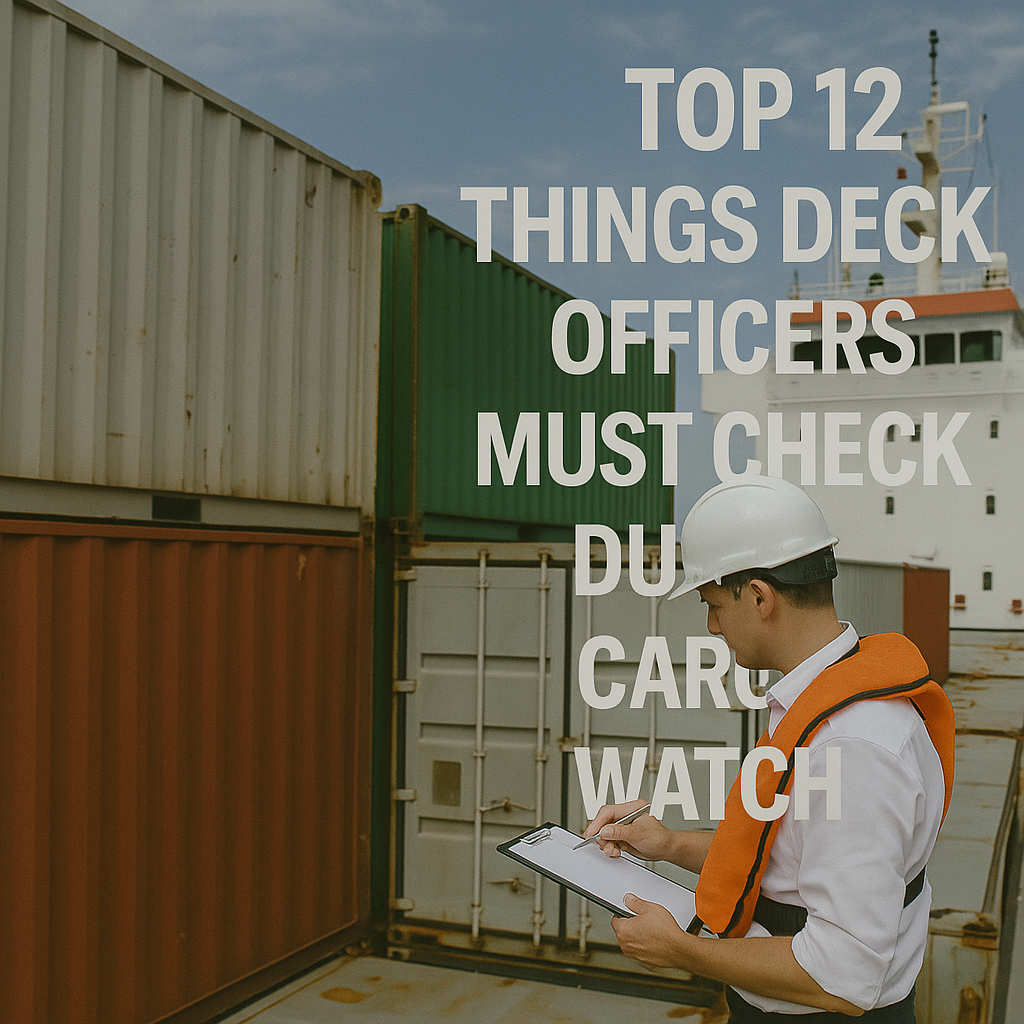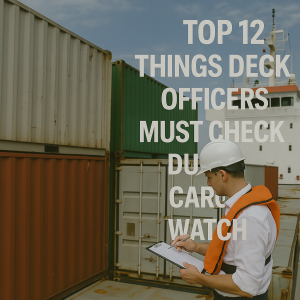Discover the 12 most important checks every deck officer must carry out during cargo watch to ensure safety, regulatory compliance, and efficient operations. Learn best practices, industry insights, and modern challenges in this detailed guide.
Picture this: it’s midnight, the port lights flicker in the distance, and deep in the belly of the ship, tonnes of cargo shift with each surge of the crane. Cargo operations are one of the most critical, risky, and responsibility-heavy tasks on any commercial ship. Whether you are handling containers in Rotterdam, crude oil in Singapore, or grain in Buenos Aires, a deck officer’s cargo watch is a frontline duty that protects the ship, crew, environment, and even the company’s reputation.
Inadequate cargo watches have led to catastrophic fires, pollution incidents, cargo loss, and damage running into millions of dollars. Regulations such as SOLAS Chapter VI, MARPOL, the ISM Code, and the STCW Convention set strict requirements for cargo operations. Yet compliance on paper is only part of the story — good seamanship is still the deciding factor.
This guide takes you through 12 crucial points deck officers must keep in mind during cargo watches, supported by real-world stories, IMO guidelines, and modern maritime practices.
Why Cargo Watch Matters in Modern Maritime Operations
Cargo watch is not simply “supervising” stevedores. It is a holistic, active safety role. A ship is only profitable if it delivers cargo on time, intact, and without environmental damage. This depends on vigilant deck officers who act as the shipowner’s guardian. Cargo damage is the single biggest cause of claims handled by P&I Clubs globally, amounting to over USD 1.5 billion in payouts annually (International Group of P&I Clubs, 2023). A proper cargo watch can:
- Prevent contamination of sensitive cargoes
- Protect the ship’s structural integrity
- Avoid stability problems
- Stop pollution before it starts
- Ensure correct cargo documents
The modern maritime industry is under intense regulatory and commercial pressure to deliver clean, safe, and efficient cargo operations. In this environment, a vigilant deck officer is essential.
–
The 12 Critical Cargo Watch Checks
Let’s break these down, with practical storytelling and modern insights.
Maintain Continuous Communication
At the heart of every safe cargo watch lies good communication. Deck officers must keep a tight link with:
-
The terminal or stevedore foreman
-
The engine room
-
Other crew on deck
-
The Master
For example, while loading containers, the OOW must confirm whether the crane operator understands stowage instructions. During tanker loading, constant dialogue with the terminal about manifold pressures or stop/start times is vital.
A real-world lesson? In 2022, a chemical tanker in Antwerp suffered a tank overflow because the shore operator increased flow without telling the ship. The deck officer missed the change, and 50 tonnes of cargo spilled overboard. Good communication would have prevented it.
Monitor Cargo Flow Rates and Pressures
Cargo watches are not passive. The OOW must actively monitor loading or discharging rates.
-
On tankers: check pressure gauges, manifold valves, and line integrity
-
On bulkers: watch for cargo pile heights and trimming
-
On container ships: monitor crane speeds and container placement
Alarm systems, if available, should be set properly. But do not rely on alarms alone — nothing replaces human observation.
ICS and OCIMF guidelines (2022) stress that officers must never allow shore staff to bypass ship instructions on rates and pressure limits, as damage to pipelines or cargo tanks could result.
Ensure Cargo Safety and Stability
As cargo piles up, the ship’s stability changes.
-
Record drafts regularly
-
Cross-check stability software
-
Look for excessive trim or list
-
Check tank sounding levels
A deck officer ignoring this can create a dangerous situation. In 2019, a general cargo ship capsized while loading steel coils because cargo was stacked too high and no one monitored GM (metacentric height). The lesson: stability is not a paper calculation alone — it is dynamic, evolving, and must be constantly checked during a cargo watch.
Check for Pollution Risks
Oil on deck? Grain dust blowing overboard? Even paint flakes near an open hatch? These can lead to huge fines under MARPOL Annex I and V.
Officers should:
-
Check scupper plugs are in place
-
Watch ballast overflows
-
Ensure hoses are properly connected
-
Check for drips or leaks
Remember: authorities and port state control can come on board at any time for a surprise pollution inspection. Prevention is cheaper than a fine.
Oversee Cargo Compatibility
On a multi-product tanker or a general cargo ship, different goods may be loaded simultaneously. If one product can react with another, disaster can strike.
For example, never allow sodium chlorate cargo to be loaded near organic matter — it could explode.
-
Review the MSDS (Material Safety Data Sheet)
-
Check the IMDG Code
-
Confirm segregation plans
A tragic case in 2015 saw a container vessel catch fire when calcium hypochlorite was stowed improperly with flammable goods. Officers must know the codes and enforce them.
Keep the Deck Area Safe and Organised
A chaotic deck is a dangerous deck.
-
Keep walkways clear
-
Coil up hoses
-
Remove welding equipment after use
-
Check lighting at night
Trips, falls, or collisions with cargo equipment are among the most common injuries reported to the Maritime and Coastguard Agency (UK MCA, 2022).
Check for Fire Hazards
Cargo operations bring ignition risks.
-
Monitor hot work permits
-
Check spark arrestors on winches
-
Confirm fire-fighting systems are ready
-
Inspect the fire line pressure
For tankers, gas detection is absolutely vital. Too many explosions have happened because no one checked that tanks were gas-free before loading.
Verify Cargo Documentation
Cargo paperwork is not just a bureaucratic task.
-
Check cargo manifest matches the Bill of Lading
-
Confirm dangerous goods declarations
-
Inspect loading plans against stability criteria
-
Log all checks properly
Port state control inspectors and P&I surveyors will always review these documents, and mistakes can lead to expensive delays.
Keep Watch on Weather Conditions
A sudden squall or shifting wind direction can endanger cargo.
-
Watch mooring lines
-
Check crane operations
-
Monitor rainfall (which can damage some cargo)
-
Report significant changes to the Master
In 2020, a ro-ro ship in Germany had its cargo damaged when a storm arrived mid-loading. The deck officer on watch failed to pause operations despite a weather alert.
Nature remains the ultimate authority at sea.
Ensure Proper Ballast Control
During cargo loading or unloading, the ship’s ballast system must be carefully managed to:
-
Maintain trim and list
-
Avoid hull stress
-
Comply with ballast water management plans (as per the BWM Convention)
Deck officers must coordinate with the engine room and verify that ballast pumps operate correctly.
Prevent Unauthorised Access
While the ship is busy, stowaways, thieves, or unauthorised personnel can slip on board. ISPS regulations (International Ship and Port Facility Security Code) require strict gangway watch.
-
Check ID of everyone coming aboard
-
Log visitors
-
Secure restricted areas
A 2021 Paris MoU report found 18% of security deficiencies involved poor gangway watch during cargo operations.
Record Everything Meticulously
If an incident happens, your logbook and cargo records are your best defence.
-
Note tank soundings
-
Record pressure alarms
-
Document conversations with terminal staff
-
Log changes in weather, draft, or stability
These records protect you, the ship, and the company if legal claims follow.
Key Technologies and Developments Driving Change
Modern maritime operations increasingly support deck officers with technology:
-
ECDIS cargo software
-
Automated manifold pressure controls
-
Electronic cargo documentation
-
Remote ship-to-shore monitoring
Class societies like ABS and Lloyd’s Register are driving integration between cargo sensors and ship automation, making it easier for deck officers to react to danger before it grows.
Challenges and Solutions
Challenge: Information overload during high-volume cargo work
Solution: Bridge Resource Management (BRM) techniques applied to cargo operations
Challenge: Environmental compliance tightening year after year
Solution: Frequent training on MARPOL, Ballast Water Management, and port regulations
Challenge: Fatigue during extended port stays
Solution: Smart watch rotations, good rest hours, and sharing duties fairly among officers
Future Outlook
Cargo operations will continue to grow more complex.
-
Green fuels (LNG, ammonia) will demand new safety skills
-
Digital twins and cargo monitoring AI will expand
-
Real-time video audits by charterers and port states will become routine
Despite all this, the fundamentals — a vigilant officer, eyes open, communicating clearly — will never go out of style.
FAQ
What is a cargo watch?
It is a duty shift where the deck officer supervises the safety, efficiency, and legality of all cargo operations.
What if I see cargo leaking?
Stop operations immediately, report to the Master, and isolate the leak source.
Who decides cargo flow rates?
The ship and shore agree on it jointly, but the ship has ultimate veto for safety.
Can stevedores bypass ship instructions?
No — the OOW must ensure shipboard safety is always prioritised.
Do deck officers check stability during cargo watches?
Yes, continuously — stability can change minute by minute.
Conclusion
A ship’s cargo watch is far more than standing by the rail with a radio. It is a layered safety net, woven from technical skill, human teamwork, and respect for regulations and nature alike.
When cargo is moving, the entire world of a ship is in motion — and the deck officer on watch stands guard over every ton. Remember these 12 points, and you will keep your vessel safe, legal, and profitable, voyage after voyage.
References
-
IMO. SOLAS Convention https://www.imo.org
-
International Group of P&I Clubs. Annual Claims Report 2023 https://www.igpandi.org
-
OCIMF. Cargo Handling Best Practices https://www.ocimf.org
-
Paris MoU. Port State Control Reports https://www.parismou.org
-
UK MCA. Code of Safe Working Practices https://www.gov.uk/government/organisations/maritime-and-coastguard-agency
-
DNV. Cargo Risk Assessments and Trends https://www.dnv.com


